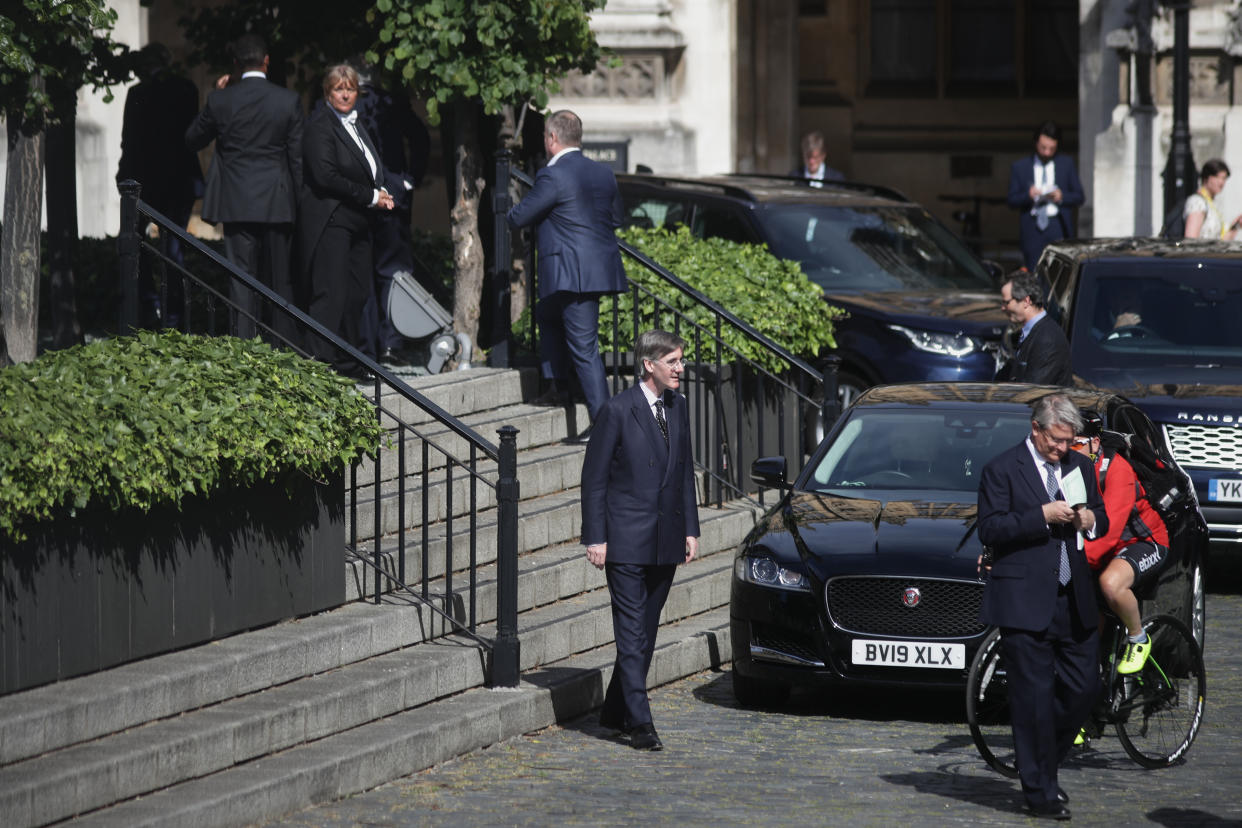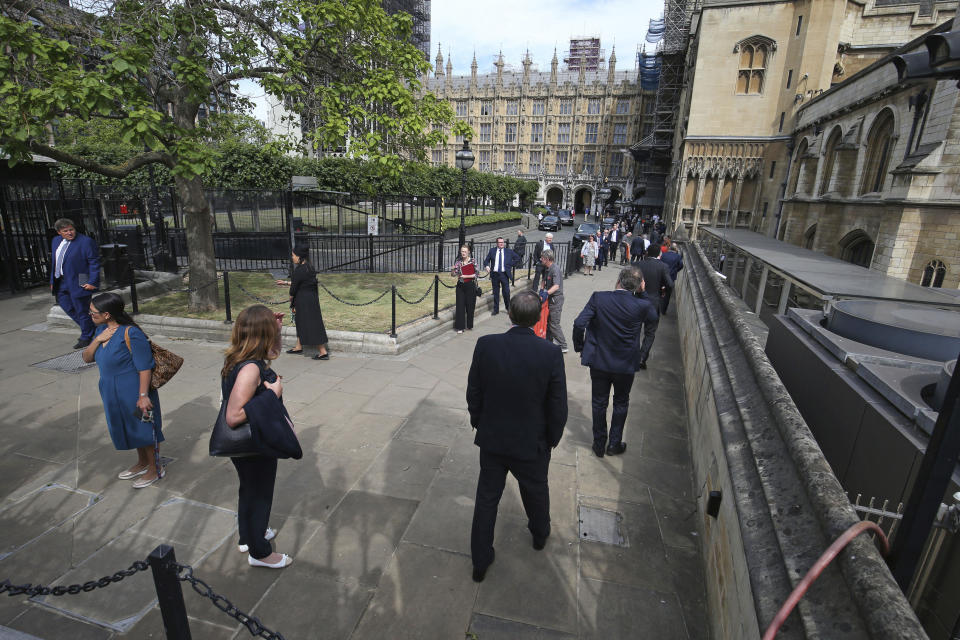Jacob Rees-Mogg urged to resign after cabinet minister falls ill with suspected coronavirus

Jacob Rees-Mogg is facing calls to resign as leader of the House of Commons amid concerns that his decision to recall parliament has created a coronavirus hotspot.
It comes after business secretary Alok Sharma was tested for COVID-19 after becoming visibly unwell in the House of Commons chamber.
Sharma has now returned home to self-isolate after struggling during a speech at the despatch box, wiping his face with a handkerchief several times.
The speech took place a day after digital voting in the Commons was shelved when MPs approved a government motion introduced by Rees-Mogg – despite widespread objections.
On Wednesday night Liberal Democrat MP Daisy Cooper called for his resignation, saying he had “needlessly put lives at risk”.
Now @Jacob_Rees_Mogg should RESIGN as @CommonsLeader: for bringing the House into disrepute, and needlessly putting lives at risk. And the Speaker @LindsayHoyle_MP should return parliament to virtual proceedings only with immediate effect - tonight @Peston
— Daisy Cooper MP 🔶 (@libdemdaisy) June 3, 2020
Senior Conservatives, opposition groups and the equalities watchdog had already raised concerns that the ending of digital voting in parliament would prevent many MPs, particularly the elderly and those who are shielding, from being able to vote.
Meanwhile a YouGov poll indicated that three-quarters (76%) of the public think MPs should be able to continue voting remotely at least until the end of the crisis, with just 12% saying they should have to vote in person.

Chaotic scenes unfolded in the Commons on Tuesday when MPs formed a long queue through parliament as they tried to maintain social distancing while voting.
The despatch box was wiped down between exchanges, but the size of the chamber made it difficult for some MPs to keep their distance as they tried to swap seats or move around.
Labour leader Sir Keir Starmer said the scenes were “shameful” and pushed the prime minister to end the “completely unnecessary and unacceptable” process.
This is just awful. The government stopped MPs from working from home and asked us to return to a building where social distancing is impossible. MPs are travelling home to every part of the country tonight. Reckless doesn’t even begin to describe it. https://t.co/Lre9clcMHW
— Lisa Nandy (@lisanandy) June 3, 2020
News of the business secretary’s illness sparked fury, with many blaming the decision to recall MPs for putting people at risk.
Labour shadow minister Toby Perkins had raised concerns over Sharma’s appearance in the Commons earlier in the day, and after learning of the test said: “This is ridiculous. It was clear that Alok Sharma looked unwell.
“If there are now fears that he may have COVID-19 and he hadn’t already tested negative, it was the height of irresponsibility for him to be in parliament sniffling, sweating and snorting from the despatch box.”
Get well soon @AlokSharma_RDG. I really hope it is not #Covid_19. MPs and staff will have been put at risk by the Government decision to not keep virtual Parliament. And in turn constituents, should he or anyone else, test positive. Bring back virtual proceedings now! https://t.co/QmRQXHdG0o
— Layla Moran 🔶 (@LaylaMoran) June 3, 2020
Liberal Democrat MP Layla Moran said that reopening Parliament was putting MPs and their staff at risk.
Dr Philippa Whitford, MP for Ayrshire, tweeted: “Hope Alok Sharma recovers quickly but he should have stopped immediately. HoC claim despatch box etc ‘deep cleaned’ but can’t clean every door handle he touched since Monday when he became infectious! Cabinet meeting was on Tuesday so will THEY isolate? Yesterday = #COVIDConga.”
It also comes as Labour MP Barry Gardiner tweeted that he had broken social distancing rules to attend a Black Lives Matter protest – a move branded ‘dangerous’ by Lisa Nandy.
It was 'dangerous' for @BarryGardiner to break social distancing measures.
Shadow Foreign Secretary @lisanandy criticises her Labour colleague for posting a video of himself breaking the rules at a #BlackLivesMatter protest in London. MR#KayBurley #BarryGardiner pic.twitter.com/LG7usoQ8iy— Kay Burley (@KayBurley) June 4, 2020
The government’s advice for people who are a ‘contact’ of someone who has tested positively for coronavirus is that they must immediately self-isolate at home for 14 days from the date of their last contact with them.
A contact is defined as a person who has been close to someone who has tested positive for COVID-19 anytime from two days before the person was symptomatic up to seven days from onset of symptoms, including “a person who has been within 2 metres of someone who has tested positive for COVID-19 for more than 15 minutes”.
Under new test & protect protocol, anyone within a 2m radius of the Business Secretary for longer than 15 mins needs to go into self-isolation for 14 days. I imagine this means a number of MPs... Leading by example? & wishing Mr. Sharma a speedy recovery. https://t.co/rDewlFs6d3
— Devi Sridhar (@devisridhar) June 3, 2020
During prime minister’s questions on Wednesday, Labour leader Sir Keir Starmer said: “If any other employer behaved like this, it’d be a clear and obvious case of indirect discrimination under the Equalities Act.”
The PM replied: “I do not think it’s unreasonable that we should ask parliamentarians to come back to this place and do their job for the people of this country.
“I know it’s difficult and I apologise to colleagues for the inconvenience and I apologise to all those who have particular difficulties because they’re shielded or elderly, the change we’re making today will mean they should be able to vote by proxy.”
Johnson also said of Sir Keir: “Our policy is test, trace and isolate, his policy is agree, U-turn and then criticise.
“What I can tell him is that I do think the people of this country on the whole will want their parliamentarians to be back at work, doing their job, passing legislation on behalf of the people of this country and that is what this government intends to do.”
Coronavirus: what happened today
Click here to sign up to the latest news, advice and information with our daily Catch-up newsletter
Read more about COVID-19
How to get a coronavirus test if you have symptoms
How easing of lockdown rules affects you
In pictures: How UK school classrooms could look in new normal
How public transport could look after lockdown
How our public spaces will change in the future
Help and advice
Read the full list of official FAQs here
10 tips from the NHS to help deal with anxiety
What to do if you think you have symptoms
How to get help if you've been furloughed

 Yahoo News
Yahoo News 


